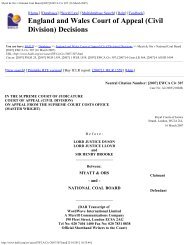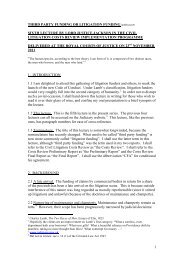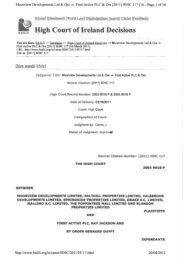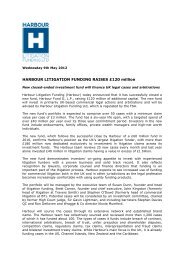[2013] SGHC 135 - Singapore Law Watch
[2013] SGHC 135 - Singapore Law Watch
[2013] SGHC 135 - Singapore Law Watch
Create successful ePaper yourself
Turn your PDF publications into a flip-book with our unique Google optimized e-Paper software.
<strong>Law</strong> Society of <strong>Singapore</strong> v Kurubalan s/o Manickam Rengaraju [<strong>2013</strong>] <strong>SGHC</strong> <strong>135</strong><br />
46 There is an emerging trend in some jurisdictions towards recognising<br />
that champertous fee agreements properly regulated can help indigent litigants<br />
gain access to justice. As Lord Phillips of Worth Matravers noted in R<br />
(Factortame Ltd) v Transport Secretary (No 8) [2003] 1 QB 381 (at 408):<br />
Conditional fees are now permitted in order to give effect to<br />
another facet of public policy – the desirability of access to<br />
justice. Conditional fees are designed to ensure that those who<br />
do not have the resources to fund advocacy or litigation<br />
services should none the less be able to obtain these in<br />
support [of] claims which appear to have merit.<br />
So too, in <strong>Singapore</strong>, has there been some push to reform the law in this<br />
direction. But we reiterate two points: first, it is for Parliament, rather than the<br />
courts, to decide whether and when such a reform is to be undertaken; and<br />
second, any such reform would almost certainly feature carefully drawn<br />
parameters that regulate the extent to which such fee arrangements would be<br />
permitted and this makes it a subject more suited for the legislature rather than<br />
for the courts to develop.<br />
Aggravating factors<br />
47 We return to the facts of the case. It is helpful first to frame the proper<br />
context in which mitigating or aggravating factors may affect the balance of<br />
considerations that are relevant to sentencing in disciplinary proceedings.<br />
48 A court that exercises disciplinary jurisdiction is likely to view<br />
mitigating factors in a qualitatively different light than would a court in the<br />
exercise of its criminal jurisdiction: see <strong>Law</strong> Society of <strong>Singapore</strong> v Tham Yu<br />
Xian Rick [1999] 3 SLR(R) 68 at [22]:<br />
Because orders made by a disciplinary tribunal are not<br />
primarily punitive, considerations which would ordinarily<br />
weigh in mitigation of punishment have less effect on the<br />
exercise of the disciplinary jurisdiction than on sentences<br />
26


![[2013] SGHC 135 - Singapore Law Watch](https://img.yumpu.com/37488807/26/500x640/2013-sghc-135-singapore-law-watch.jpg)
![Neutral Citation Number: [2010] EWHC 941 (QB) - Harbour ...](https://img.yumpu.com/47188668/1/190x245/neutral-citation-number-2010-ewhc-941-qb-harbour-.jpg?quality=85)
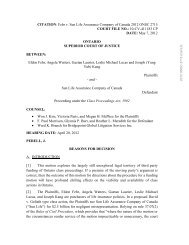
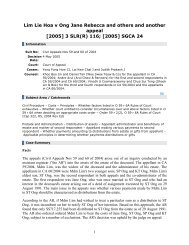
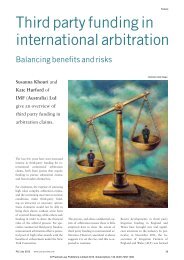
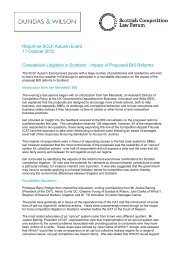
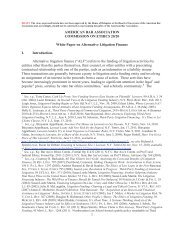

![Hall v Poolman [2009] - Harbour Litigation Funding](https://img.yumpu.com/37488843/1/190x245/hall-v-poolman-2009-harbour-litigation-funding.jpg?quality=85)
